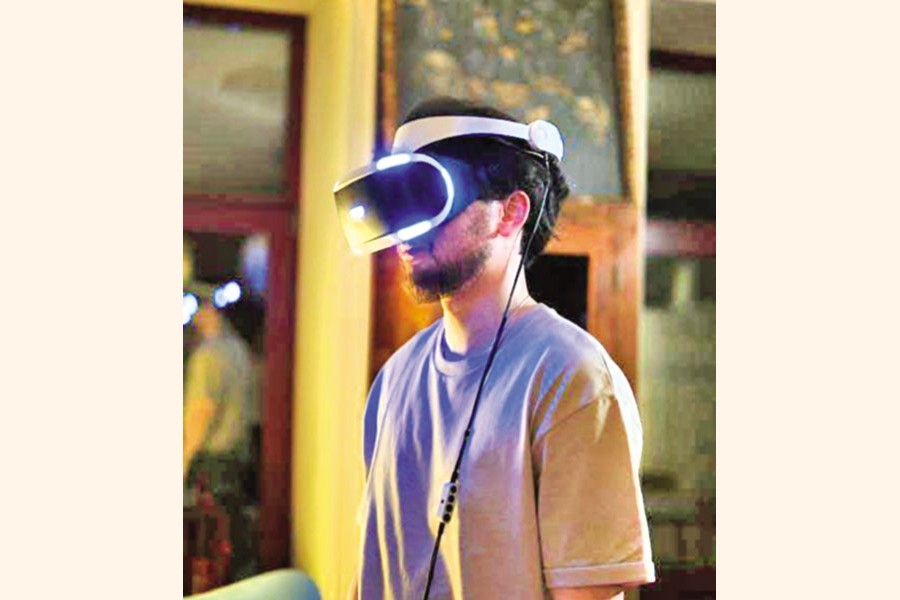
Published :
Updated :

Justin Bieber's song 'Let Me Love You' features a beautiful story of a mugger couple who are part of a Virtual Reality game. The couple is madly in love, they only care about themselves, and dangerously fight with the enemies and loot their cash. Two players are playing the game using headsets and hand-gears in their hands and at the end of the music video, their expressions say how surreal it felt.
Yes, Virtual Reality or VR is surreal. Imagine having a setup where one could feel, see and hear using just a headset and another gear in hands that is enabled with special sensors made to touch, sense, and do things with one's hands. And if this is enabled for a video game, the world goes beyond surreal feelings.
For the past few years, in the gaming industry, Virtual Reality has been sparking new possibilities. However, the problem is the expensive devices required to play VR games. In the Bangladeshi context, the price is quite high. Nonetheless, it is too early to lose hope.
One of the main components of VR gaming devices is the graphics card. Price of VR worthy graphics cards is supposedly going to reduce in future as said by NVIDIA and AMD- two of the worlds' leading GPU (Graphics Processing Unit) manufacturers. However, the price of powerful GPUs fluctuates a lot and VR gaming requires more power to deliver the senses in a game. In addition, the computer memory follows the 'the higher, the better' rule for VR. Consequently, to play high-end games, one needs a better performing PC with bigger RAM.
3D Solution Bangladesh, a brand focusing on VR gaming, has already gained attention through many Facebook users. The brand delivers VR gaming equipment across the country. As clients from Dhaka and other parts of the country are reaching out to them, it's visible that there is a new industry in the making.
Safin Kamal, a second-year student of Computer Science and Engineering at East West University shares that VR gaming for mobile is not really in reach. Rather there are some PC versions. "Since VR requires more power, memory and a smart GPU, many cannot afford to play those games," adds the young game enthusiast. However, he believes problems regarding price will diminish gradually.
On the other hand, there is a new trend which is creating play stations for gamers to pay and play. But this needs cheaper offers and more platforms to become widespread. There are not many cybercafés in Dhaka or outside Dhaka. Cybercafes can be one such place where VR gaming platforms can be created for wider audience reach and more engagement. There is huge potential for Bangladesh to thrive in the VR gaming industry if such gaming platforms find investment.
Virtual Reality's much-needed headset comes from Augmented Reality (AR), a technology that is much handily used to experience three-dimensional (3D) simulations. AR gives mobile access to a 3D simulated environment and is expected to burgeon in the industry in future. Another Bangladeshi brand focusing on AR based gaming is Azmi Studio. The brand is one of the leading AR-based game development companies in the country. It has launched many AR-based games and projects, including one to experience firefighter training. As both the industries have come a long way globally, Bangladesh is yet to make a footprint and the first step is getting it popularised among the gamer communities.
However, an entrepreneurial rise in the software development industry of Bangladesh is quite noticeable. This gives hope that VR device manufacturing companies will show up in Bangladesh. Bangladesh has only a handful of startups in the field of VR gaming. The local developers can draw inspiration from the countries that are doing well in VR and AR gaming. As for the startups, the economy and details of those countries should be looked at. For example, China had a US$ 8.5 billion worth VR market in 2020, reported by Bloomberg. Bangladeshi developers and startups can follow China's pattern.
The VR/AR gaming phenomenon in Bangladesh is relatively new and will take time to expand. Wide-scale adoption of VR in organisations in the country, security and sufficient allocation of budget for the new types of technologies like VR and AR will be needed to shape a successful industry. In addition, Bangladesh should create national level awareness of skills for development and implementation work. If all those fall in place, there will be a new industry with immense potential of employment and career opportunity for youths.
The writer is a student of Computer Science and Engineering at East West University.
sofiautilitarian@gmail.com


 For all latest news, follow The Financial Express Google News channel.
For all latest news, follow The Financial Express Google News channel.